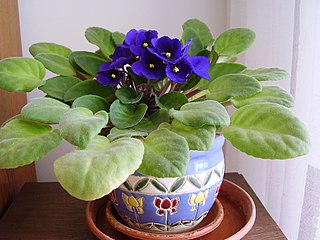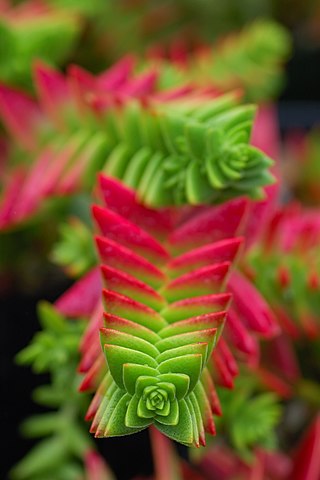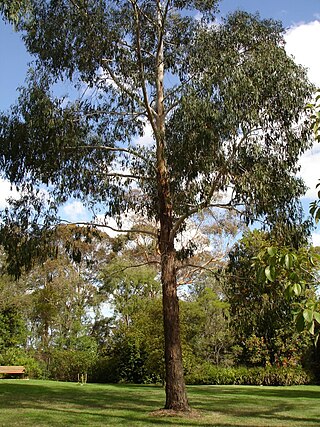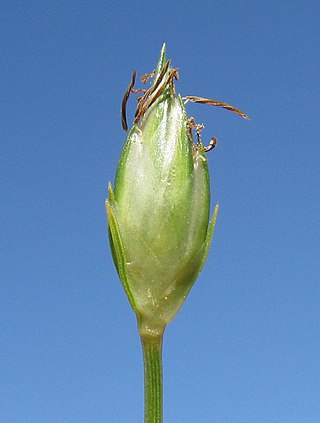
Catalpa, commonly also called catawba, is a genus of flowering plants in the family Bignoniaceae, native to warm temperate and subtropical regions of North America, the Caribbean, and East Asia.

Forsythia, is a genus of flowering plants in the olive family Oleaceae. There are about 11 species, mostly native to eastern Asia, but one native to southeastern Europe. Forsythia – also one of the plant's common names – is named after William Forsyth.

Gesneriaceae, the gesneriad family, is a family of flowering plants consisting of about 152 genera and ca. 3,540 species in the tropics and subtropics of the Old World and the New World, with a very small number extending to temperate areas. Many species have colorful and showy flowers and are cultivated as ornamental plants.

Crassula is a genus of succulent plants containing about 200 accepted species, including the popular jade plant. They are members of the stonecrop family (Crassulaceae) and are native to many parts of the globe, but cultivated varieties originate almost exclusively from species from the Eastern Cape of South Africa.

Stewartia is a genus of 8-20 species of flowering plants in the family Theaceae, related to Camellia. Most of the species are native to eastern Asia in China, Japan, Korea, Laos, Myanmar, Thailand, and Vietnam, with two in southeast North America, from Virginia and Kentucky south to Florida and Louisiana.

Nepenthes ovata is a tropical pitcher plant endemic to Sumatra. The specific epithet ovata is Latin for "ovate" and refers to the shape of the lower pitchers.

Dillenia is a genus of flowering evergreen or semi-evergreen trees and shrubs in the family Dilleniaceae, native to tropical and subtropical regions of southern Asia, Australasia, and the Indian Ocean islands.

Neottia ovata, the common twayblade or eggleaf twayblade, is a terrestrial orchid widespread across much of Europe and Asia

Eucalyptus ovata, commonly known as swamp gum or black gum, is a small to medium-sized tree species that is endemic to south-eastern Australia. It has mostly smooth bark, glossy green, lance-shaped to egg-shaped adult leaves, green flower buds in groups of seven, white flowers and conical to bell-shaped fruit.

Neottia cordata, the lesser twayblade or heartleaf twayblade, is an orchid of upland bogs and mires that rarely exceeds 15 cm (5.9 in) in height. It was formerly placed in the genus Listera, but molecular phylogenetic studies have shown that Neottia nidus-avis, the bird's-nest orchid, evolved within the same group.

Thevetia is a genus of flowering plants in the family Apocynaceae, first described for modern science as a genus in 1758. It is native to Mexico, Central America, South America, and Cuba. The taxonomy of the genus is controversial, with some authors including Cascabela within Thevetia, while others accept the two genera as separate.

Neottia is a genus of orchids. The genus now includes the former genus Listera, commonly known as twayblades referring to the single pair of opposite leaves at the base of the flowering stem. The genus is native to temperate, subarctic and arctic regions across most of Europe, northern Asia, and North America, with a few species extending into subtropical regions in the Mediterranean, Indochina, the southeastern United States, etc.

Crassula ovata, commonly known as jade plant, lucky plant, money plant or money tree, is a succulent plant with small pink or white flowers that is native to the KwaZulu-Natal and Eastern Cape provinces of South Africa, and Mozambique; it is common as a houseplant worldwide. Much of its popularity stems from the low levels of care needed; the jade plant requires little water and can survive in most indoor conditions. It is sometimes referred to as the money tree; however, Pachira aquatica also has this nickname.

Viviania is a genus of flowering plants belonging to the family Francoaceae.
Hemipilia ovata is a species of flowering plant in the family Orchidaceae, native to south-central China.

Melhania ovata is a plant in the family Malvaceae.
Howelliella is a monotypic genus of flowering plants belonging to the family Plantaginaceae. It only contains one species, Howelliella ovata.
Saracha is a genus of flowering plants belonging to tribe Physaleae of subfamily Solanoideae of the nightshade family Solanaceae. The genera most closely related to Saracha are Iochroma, Dunalia, and Vassobia.
Pitraea is a monotypic genus of flowering plants belonging to the family Verbenaceae. It only contains one known species, Pitraea cuneato-ovata(Cav.) Caro

Abildgaardia ovata, synonyms including Abildgaardia monostachya and Fimbristylis ovata, is a perennial herb of the genus Abildgaardia and the family Cyperaceae. It is a widespread species that can be found in West, Southern and East Africa, Florida, Mexico, the Caribbean and in some countries of Latin America.
















